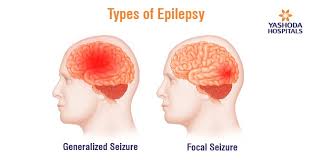Epilepsy, a neurological complaint characterized by changeable seizures, is frequently misknew as solely a condition defined by these convulsive occurrences. still, beyond the seizure lies a different array of symptoms and instantiations that can significantly impact the lives of those affected. Understanding these symptoms is pivotal for proper opinion, treatment, and support. In this composition, we claw into the world of epilepsy beyond seizures, exploring its colorful symptoms and their counteraccusations .
1. Air Sensations
Before some seizures do, individualities with epilepsy may witness what’s known as an air. ambiences are private sensations that act as advising signs of an impending seizure. These sensations can vary extensively among individualities and may include visual disturbances, strange smells or tastes, passions of fear or déjà vu, and indeed physical sensations similar as chinking or impassiveness. Feting these ambiences can give precious perceptivity into the type and position of seizures, abetting in treatment planning and seizure operation strategies.
2. Cognitive And Emotional goods
Epilepsy can also impact cognitive functions and emotional well- being. Cognitive epilepsy symptoms may include difficulties with memory, attention, attention, and language. individualities with epilepsy may witness cognitive impairments as a result of seizures, drug side goods, or underpinning structural abnormalities in the brain. also, epilepsy is frequently associated with mood diseases similar as depression and anxiety, which can further complicate cognitive difficulties and reduce quality of life. Proper evaluation and operation of these cognitive and emotional symptoms are essential factors of comprehensive epilepsy care.
3. Motor Abnormalities
In addition to convulsive seizures, epilepsy can manifest as colorful motor abnormalities. These may include metrical jerking movements( myoclonic seizures), unforeseen loss of muscle tone( atonic seizures), repetitious movements( automatisms), or complex motor actions( similar as walking or waving). These motor symptoms can be disruptive and potentially dangerous, leading to injuries or accidents if not duly managed. Understanding the nature and frequence of these motor abnormalities is pivotal for acclimatizing treatment approaches and minimizing their impact on diurnal functioning.
4. sensitive Disturbances
Epilepsy can also affect sensitive processing, leading to disturbances in vision, hail, touch, or smell. Visual disturbances similar as flashing lights or visual visions( visual ambiences ) are common in certain types of epilepsy. audile visions or deformations of sound perception may also do. sensitive symptoms can vary in intensity and duration and may do singly or in confluence with other seizure instantiations. relating these sensitive disturbances and their triggers can give precious perceptivity into seizure mechanisms and companion treatment opinions. At South Valley Neurology, specialists are devoted to exhaustively addressing the different array of symptoms associated with epilepsy, going beyond seizures to give acclimatized care and support to individualities living with this neurological complaint.
5. Autonomic Dysfunction
Autonomic dysfunction refers to abnormalities in the functioning of the autonomic nervous system, which regulates involuntary fleshly functions similar as heart rate, blood pressure, digestion, and temperature control. Seizures forming from certain brain regions can disrupt autonomic function, leading to symptoms similar as changes in heart rate or meter, oscillations in blood pressure, gastrointestinal disturbances, or differences in sweating patterns. These autonomic symptoms can be intimidating and may mimic other medical conditions, challenging careful evaluation and discriminational opinion.
In conclusion, epilepsy encompasses a broad diapason of symptoms and instantiations beyond the stereotypical convulsive seizures. From air sensations and cognitive impairments to motor abnormalities, sensitive disturbances, and autonomic dysfunction, the impact of epilepsy extends far beyond the seizure itself. Feting and understanding these different symptoms are essential for furnishing comprehensive care to individualities living with epilepsy. By addressing the multifaceted nature of epilepsy, healthcare providers can more knitter treatment approaches, ameliorate symptom operation, and enhance the quality of life for those affected by this complex neurological complaint.

